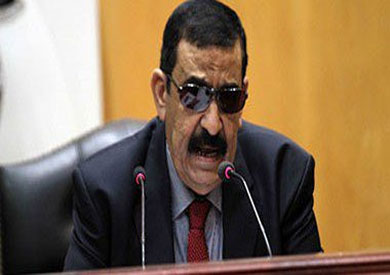Latest NEWS
- Aswat Masriya, the last word
- Roundup of Egypt's press headlines on March 15, 2017
- Roundup of Egypt's press headlines on March 14, 2017
- Former Egyptian President Hosni Mubarak to be released: lawyer
- Roundup of Egypt's press headlines on March 13, 2017
- Egypt's capital set to grow by half a million in 2017
- Egypt's wheat reserves to double with start of harvest -supply min
- Roundup of Egypt's press headlines on March 12, 2017
Judge Nagy Shehata ordered to step down from 'terrorist cell' case

Judge Nagy Shehata - Al-Shrouk
Written by Nourhan Fahmy
CAIRO, Jan 4 (Aswat Masriya) - The Cairo Appeals Court accepted Monday the recusation request submitted by the defence team in the case known as "Awsim Cell", presided over by Judge Nagy Shehata.
The Court's order indicates that Shehata has been deemed unqualified to perform his legal duties with regards to this particular case, and therefore another judge will be assigned.
The defence team submitted the request following Judge Shehata's controversial statements in a recent interview with Al-Watan newspaper.
"Judge Shehata's statements to the press, in which he expresses his political opinion regarding events and certain movements and individuals, are considered an infringement of judicial norms that can potentially influence the verdicts, deeming him unqualified to preside over the case," the defence team stated.
The judge's statements reveal contempt of the January 25 revolution and its aftermath as well as the targeting of certain movements and individuals.
After facing strong criticism, Shehata retracted his statements, and accused the newspaper of fabrication, instigating a media battle between the judge and the privately-owned newspaper.
In response to Shehata's accusations, Al-Watan published a statement confirming that the interview was accurately published and that the newspaper took all necessary precautions to ensure objectivity in addition to removing certain statements that would have caused serious problems within the judiciary.
Being famous for handing down numerous death sentences, Shehata presided over several high-profile cases, among which are the "Rabaa Operations Room", "Marriot Cell" or Al-Jazeera trial, the Cabinet Clashes and violence in Kerdasa trial.
In April 2015, Shehata handed down death sentences to Mohamed Badie and 13 others, while 26 received life imprisonment on charges of forming an "operations room to resist the state and spread chaos" following the dispersal of the two pro-Mursi sit-ins in Rabaa Al-Adaweya and Nahda Square in August 2013.
The Court of Cassation accepted the appeals on verdicts issued against 38 defendants in the case in December. The first retrial session is scheduled for Feb. 8.
In December 2014, Shehata sentenced 183 individuals to death on charges related to violence in Kerdasa town in Giza dating back to 2013.
The three well-known Al-Jazeera journalists; Mohamed Fahmy, Baher Mohamed and Peter Greste were initially given sentences of seven to ten years in prison.
In all of the cases mentioned above, the initial sentences were overturned by the higher-degree courts and retrials were ordered. In some cases, as in the "Kerdasa violence" trial, the appeals of some defendants have yet to be reviewed by the Court of Cassation.
In the "Awsim Cell" case, defendants are accused of creating and managing a "terrorist cell" responsible for calls for suspending the constitution, attacking public and private facilities, and targeting army and security personnel.
The General Prosecution further accused the defendants of planting an explosive device in front of the Awsim City Council, and attempting the assassination of a Criminal Court judge.
Egypt is battling a rising militant insurgency, particularly in North Sinai, that peaked following the military's ouster of former President Mohamed Mursi in July 2013 following mass protests against his rule.
The government listed the Brotherhood as a terrorist organisation in December 2013 and insists it is behind the wave of militancy which has targeted security personnel since July 2013.
The Brotherhood continuously denies the accusations.










